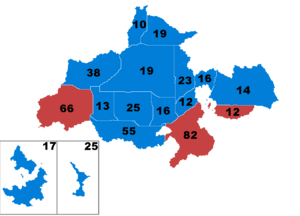2019 Soltenish Presidential Election
| |||||||||||||||||||||||||||||
462 votes up for election 232 votes needed to win | |||||||||||||||||||||||||||||
|---|---|---|---|---|---|---|---|---|---|---|---|---|---|---|---|---|---|---|---|---|---|---|---|---|---|---|---|---|---|
| Registered | 116,077,437 ( | ||||||||||||||||||||||||||||
| Turnout | 92,702,152 (80.0%) ( | ||||||||||||||||||||||||||||
| |||||||||||||||||||||||||||||
 Republics won by Aurelio Di Biviu
Republics won by Mateo Benzi | |||||||||||||||||||||||||||||
| |||||||||||||||||||||||||||||
The 2019 Soltenish presidential election was the 8th sexennial presidential election in Soltenia and was held on Wednesday, July 10, 2019. Confederal Union candidate Aurelio Di Biviu soundly defeated incumbent Social Democratic president Mateo Benzi by 9.4 points, the largest margin since Girardino DaCareza's landslide victory in 2007. This election marked the first time an incumbent president lost re-election since 1995.
Benzi's unpopularity and poor relations with Social Democratic leaders encouraged an unsuccessful intra-party challenge by Viernese senator Giacomo Piumapetra. Meanwhile, the Confederal Union nominated the incumbent president of Colpi, Aurelio Di Biviu, who faced challenges from former Sinoran senator Giorgio Cespuglio and former foreign minister, Alberto Razelli. Di Biviu was nominated with the support of 59.8% of the party's membership at the party's convention in Carez. In a gesture of unity, Di Biviu promised Cespuglio and Razelli considerable roles in his administration.
Di Biviu campaigned for increased defense spending, economic reforms aimed at reducing inequality, crime reduction, and a reduction of inflation. His campaign was aided by public dissatisfaction with Benzi, the January bombings in Carez, and a worsening economy marked by high inflation. Benzi attacked Di Biviu as a dangerous right-wing extremist, and warned that Di Biviu would cut public healthcare and pension programs in order to pay for his higher defense and policing budget.
Di Biviu won the election by a landslide, taking 302 presidential votes and 54.0% of the popular vote to Benzi's 44.6%. Benzi carried just three republics (Vierna, Culmia, and his home republic of Almarence). All other candidates took 1.3% of the popular vote. Due to this election being the first loss by the United Left alliance since 1995, some scholars have considered this election a political realignment that brought the Confederal Union party back into relevancy.

